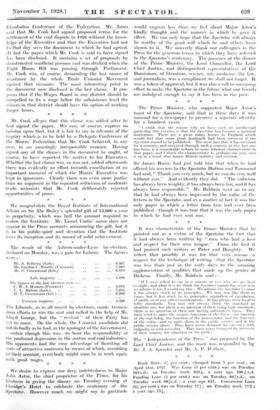It was characteristic of the Prune Minister that he pointed
out as a virtue of the Spectator the fefet that it had always been written by " men who had a hive and respect for their own tongue." From the first it had praised such writers as Pater and Doughty. We reflect that posSibly it was for that very reason—a respect for the technique of writing—that the Spectator was less than just in the early days to flue amazing agglomeration of qualities that made up the genius of Dickens. Finally, Mr. Baldwin said :---- " If I were. asked to say in a minute or two why we are here to-night, and what it is we think the Spectator stands for, what it is we admire it. for, I would say this : We admire the Spectator la:cause it has always stuck to its principles. We may not like them at times, but it has stuck to its principles. regardless of circulation, of profit, or of any other consideration. It has always been loyal to lofty standards. You may not always think the standard an absolute one, but there is no question of their being high standards, there is no question of their not having adhered to them. They have tried to unite the various functions of the Press--- the function of the watchdog, the function of the newsvemlor. and the function of the critic—and to unite them in the public service, and in the public service alone. They have never debased the enr-eney with vulgarity or with triviality. They have never bet rayed t he in of their country for sensation or for profit."
The " Independence of the Press " was proposed by the Lord Chief Justice, and the toast was responded to by Mr. J. A. Spender and -Mr. A. P.' IP-Thert.
* * * *


















































































































 Previous page
Previous page